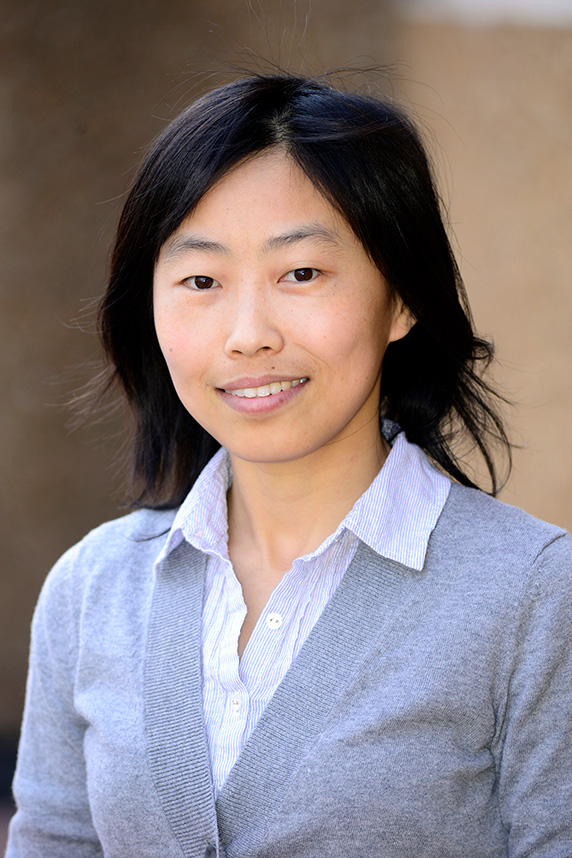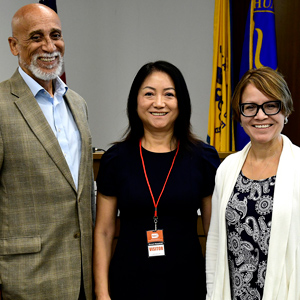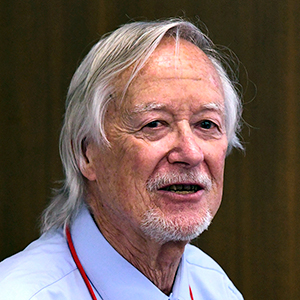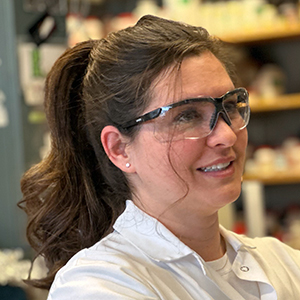NIEHS researchers have discovered a possible explanation for why flavonoids, the healthy chemicals in many fruits and vegetables, may be so good for you.
 Shears’ research group aims to promote the development of new genetic and pharmacological approaches to improving human health and longevity in the face of environmental effects. (Photo courtesy of Steve McCaw)
Shears’ research group aims to promote the development of new genetic and pharmacological approaches to improving human health and longevity in the face of environmental effects. (Photo courtesy of Steve McCaw)The scientists reported that quercetin, a flavonoid found in capers, dill, chili peppers, fennel, onions, and cranberries, specifically blocked the activity of a protein called IP6K that promotes the migration of cancer cells to different regions of the body, also known as metastasis. The findings, published in the Journal of Medicinal Chemistry, could be used to create medicines based on the naturally occurring chemicals’ healing properties.
“We applied advanced structural biology techniques to picture, at the level of individual atoms, the manner in which dietary flavonoids interact with IP6K,” said senior study author Stephen Shears, Ph.D., head of the Inositol Signaling Group at NIEHS. “Knowledge of these interactions provides a template that chemists can improve upon to design better cancer inhibitors.”
Health benefits of flavonoids
Flavonoids are one of the largest nutrient families known to scientists, numbering more than 6,000. The best sources include green tea and red wine, as well as a variety of fruits and vegetables. Several studies indicate that flavonoids reduce the risk of cardiovascular disease, type 2 diabetes, and cancer.
Flavonoids can also prevent specific types of proteins, known as protein kinases and phospholipid kinases, from functioning properly.
Despite their reported health benefits, flavonoids interact with other proteins, so they may cause unwanted side effects. As a result, scientists have tried to learn as much as they can about the structure and function of these compounds so they can design drugs that mimic their benefits.
Structure reveals function
In this study, Shears and his team focused on quercetin and similar flavonoids. The researchers surveyed the effect of these flavonoids on the function of two closely related proteins, namely inositol hexakisphosphate kinase (IP6K) and inositol polyphosphate multikinase (IPMK). Drug developers would like to target IP6K, which plays a role in cancer, while leaving IPMK alone.
The researchers identified a small collection of flavonoids that blocked the function of IP6K but not IPMK. They used a sophisticated imaging technique called X-ray crystallography to capture how these flavonoids interacted with IP6K and IPMK at the atomic level. These techniques provided a structural map that showed exactly how the flavonoid was able to home in on IP6K.
Mimicking flavonoids’ anti-cancer effects
 Gu is a fellow in Shears’ research group. (Photo courtesy of Steve McCaw)
Gu is a fellow in Shears’ research group. (Photo courtesy of Steve McCaw)In follow-up experiments in human colon cells, the researchers confirmed that quercetin and two other flavonoids specifically targeted IP6K without also targeting IPMK.
“There is much disagreement on how human health benefits from dietary flavonoids,” said lead study author Chunfang Gu, Ph.D., a postdoctoral fellow in Shears’ laboratory. “Our work uncovers a novel mechanism — inhibition of the IP6K protein. What distinguishes our work is the discovery that IP6K is affected by levels of flavonoids found within a balanced human diet.”
The findings pinpoint a likely cause for the known beneficial effects of consuming flavonoids. They also provide a platform to launch drug development studies for treating colon cancer, type 2 diabetes, and cardiovascular disease.
Citation: Gu C, Stashko MA, Puhl-Rubio AC, Chakraborty M, Chakraborty A, Frye SV, Pearce KH, Wang X, Shears SB, Wang H. 2019. Inhibition of inositol polyphosphate kinases by quercetin and related flavonoids: a structure-activity analysis. J Med Chem 62(3):1443–1454.
(Kirsten Hoff, Ph.D., is an Intramural Research and Training Award fellow in the NIEHS Mitochondrial DNA Replication Group.)









